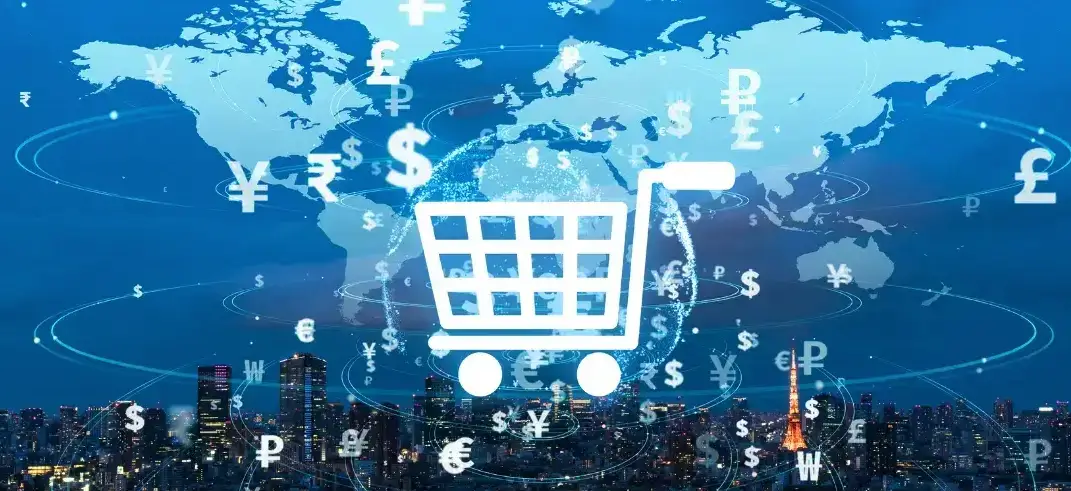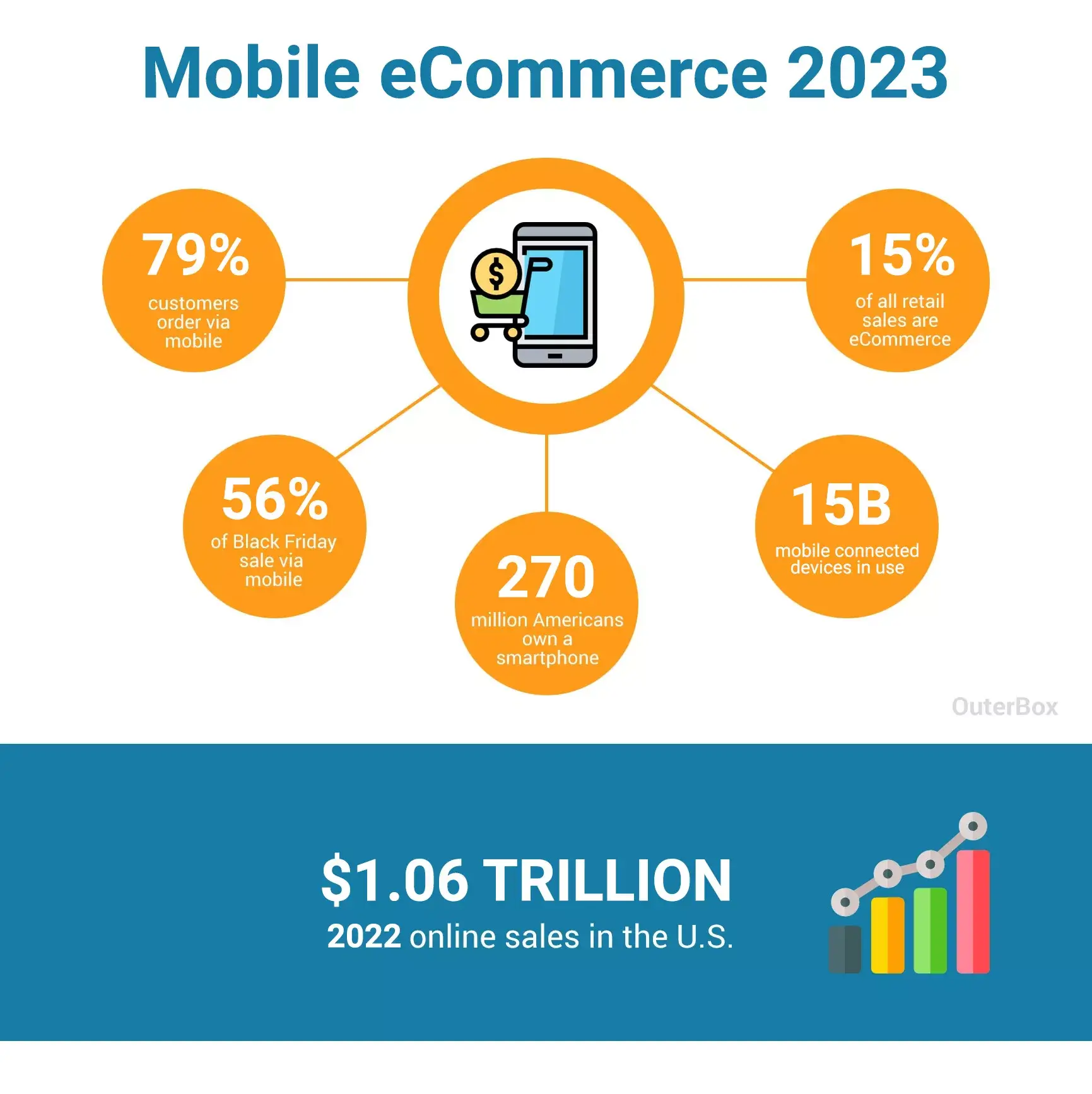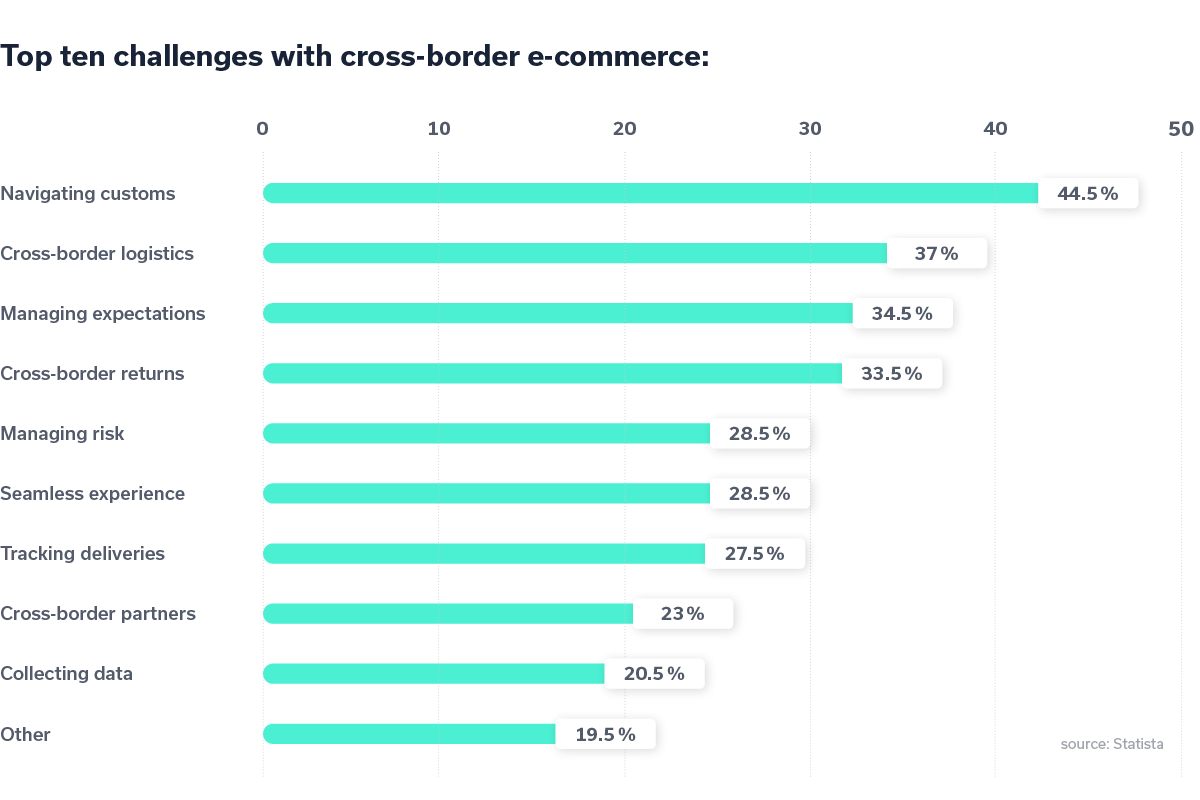A global retail landscape that can make and sell goods for a global market is emerging. Consumers from all over the world now have access to purchase ecommerce products online.
*Updated 10/27/2024
Whether you're in a remote corner of the world or in the heart of it, you can build and grow your own e-commerce business.
As more people worldwide gain access to the internet, more purchases are happening online every day.
The world's population is nearing 8 billion, and all online shopping metrics and stats suggest that not only has a paradigm shift begun, but it has already taken over.
Article Shortcuts:
- What are cross-border shoppers?
- Benefits of cross-border shopping
- Drawbacks of cross-border shopping
- What are Black Friday and Cyber Monday?
- How important are Black Friday and Cyber Monday Sales?
- Taking advantage of cross-border markets
- Optimize your e-commerce site for mobile users
- How to implement a cross-border shopping strategy

Custom image created in Canva
In the past, consumers have said they haven’t shopped online because they’re concerned about the ease of shopping, so they prefer brick-and-mortar locations.
As an eCommerce retailer, one of your key challenges is to ensure that your e-store provides a truly remarkable online experience – meaning it must feel just as good as the in-store experience.
A large retailer that's doing well online needs to begin rethinking the entire retail chain.

New customer service strategies have been developed to help retailers in every industry increase sales and profits. Retailers should use them to increase their bottom line.
An omnichannel strategy is vital to retailers who want to reach consumers wherever they are, whether online or offline.
Retail is experiencing a paradigm shift right now.
What are Cross-Border Shoppers?
Cross-border shoppers are international consumers who purchase on an eCommerce website from another country.
They are likely based in one country but may buy products or services online from another. Cross-border shoppers include international tourists, expatriates, and people who have moved abroad for work or study.
Cross-border shoppers have several reasons for shopping online. These include:
- Ease of buying from a different country
- Convenience of shopping without leaving home
- The price and quality of goods online
- Many websites offering free shipping worldwide
Benefits of Cross-Border Shopping
-
Scaling
Globalization has brought about many advantages to business owners. It can help you increase your market share, reduce your production costs, and even expand your customer base.
James Crawford, co-founder of DealDrop, said,
“One of the most common reasons for selling online is to reach a global audience. This is possible by having an online store that offers goods or services in multiple languages."
-
Global branding
Branding globally used to be a key advantage of a very select few multinational titans in business.
Their sheer size and financial backing allowed them to do so and were one of the critical barriers to entry for all small to medium-scale companies who wanted to reach potential markets worldwide.
The advent of the internet forced a more level playing field. Branding globally used to be a key advantage of a very select few multinational titans in business.
Their sheer size and financial backing allowed them to do so and were one of the critical barriers to entry for all small to medium-scale companies who wanted to reach potential markets worldwide.
-
DTC (Direct-To-Customer) relationships
Michael Nemeroff, CEO & Co-Founder of Rush Order Tees, names four benefits of DTC:
- Decreased turnover costs: Fewer customer complaints and higher customer satisfaction, resulting in lower customer turnover costs.
- Improved sales conversion rate: Increase the chances of converting a new customer into a long-term customer.
- Increased customer referrals: By providing exceptional customer service, you will be more likely to refer your customers to others, leading to increased customer referrals.
- Increased customer retention: Customers who feel appreciated will be more likely to continue doing business with you.
Drawbacks of Cross-Border Shopping
-
Shipping, taxes, currency conversions, and duties
Constant currency fluctuations, tax bracket changes, and shipping issues are vital concerns of cross-border shoppers. These differ from country to country, which makes it cumbersome to compute your margins.
Hiring a 3rd party logistics provider usually solves a couple of these issues.
-
Logistical delays, returns, and complaints
Logistics need to be handled by a reliable third-party provider, and you need to set up at least an online customer support system to help assist with customers' concerns.
Preferably a local company within the area if possible. According to the study above, these are the primary concerns of would-be cross-border shoppers.
-
Laws, restrictions, and regulatory concerns
A perfect example would be the EU’s GDPR - a 2018 privacy and security law. The General Data Protection Regulation (GDPR) is the world's most stringent privacy and security law.
It will change the way all businesses manage personal information. It will require companies to process data of EU citizens.
What are Black Friday and Cyber Monday?
The day after Thanksgiving is known as Black Friday. It is the unofficial start of the holiday shopping season. Retailers begin to offer discounts on their products to attract customers.
The day after that it’s called Cyber Monday. Cyber Monday is a term used to describe the Monday following Thanksgiving Day.
Cyber Monday was created on November 28, 2005, by Amazon to compete with other online shopping sites.
Black Friday and Cyber Monday are also used to describe the day after Thanksgiving or the Monday after Thanksgiving.
How Important are Black Friday and Cyber Monday Sales?
They are two of the biggest online shopping days of the year and have become a mainstay in eCommerce.
Black Friday and Cyber Monday have become an annual tradition for shoppers, with millions of people flocking to stores to grab great deals on everything from TVs to shoes.
Black Friday and Cyber Monday are the best examples of this, and the acronym “BFCM” is something marketers and customers get excited about each year.
With that said, they're also big businesses for eCommerce. Consumers spend around $9 billion on Black Friday alone. And with Cyber Monday, another $10 billion is spent on the day after Thanksgiving.
These are the two biggest spending seasons (apart from the Christmas season) where eCommerce store owners should jump on.
Not doing so would be foolhardy as the world is still reeling from the effects of the pandemic, and every retailer should take advantage of this.
Take Advantage of Cross-Border Markets
Black Friday and Cyber Monday are events when people are on the hunt for buying and looking for deals, with high intent to make a purchase.
Retailers need to take advantage of the fact that most purchases by cross-border shoppers happen within this timetable. Here are some clever ways to convert cross-border shoppers into buyers this Black Friday and Cyber Monday.
In an interview, Yang Zhang, CEO of Plasmic, stresses,
"Online retailers should optimize each product page designed for conversion and upsell, and show your best-selling products on your landing pages. These are the most vital pages in your website and should be treated accordingly.”
And according to Peter Robert, CEO & Co-Founder of Expert Computer Solutions / ECS,
"We should use the proper tools to monitor everything from keyword research to store analytics. Choose a platform with a large enough user base to take advantage of special sales events like Black Friday and Cyber Monday."
Optimize Your eCommerce Site for Mobile Users

Currently, 4.32 billion mobile internet users, and 62% of internet users use their handheld devices to browse the web.
Designing your website to perform its best for mobile devices would maximize your chances at organic traffic per Google’s new rules. On top of that, increasing mobile users’ UX (user experience) will increase your chances for retention and conversions.
How To Implement a Cross-Border Shopping Strategy
- Customer retention is paramount. Inform current cross-border customers first. Create a mailing list for past customers and keep them updated on deals.
- Allow payment methods that are popular with cross-border shoppers. Some locations will have a payment method that customers in their region trust.
- Use a data-driven approach for efficiency. Collect data through forms, surveys, and mailing lists.
- Outsource customer support and logistics to ease doubts from cross-border shoppers. Find a reliable 3rd party logistics provider familiar with cross-border transactions.
- Make use of social media platforms that contain your customer demographic. Be aware of what social media advertising campaigns you should use for engagement and potential conversions.
- Utilize QR code technology. The future of commerce is touch-free. QR codes and digital wallets allow people who don't have credit cards or are afraid of fraud the opportunity to pay for items online without sharing credit card information.
We are rapidly moving towards a cashless society, and the QR code trend will likely be one of the steps in that direction.
Conclusion
We are at an exciting time right now with the cross-border shopping trend. The holiday shopping season starts earlier and earlier, so preparing your Black Friday campaigns cannot wait.
It's not just a few weeks in December anymore. Black Friday, Cyber Monday, and cross-border shopping have changed the landscape for almost all of the 4th quarter.
Many of these shoppers are ready to buy now, but many traditional brick-and-mortar stores no longer have a massive advantage.
This is where your eCommerce website and social media come in. Content marketing can help you reach more of your customers and drive more of your revenue.
As a business, you have a golden opportunity in your hands, and applying everything you've learned in this article is vital.
Author Bio
Andre Oentoro is the founder of Breadnbeyond, an award-winning explainer video company. He helps businesses increase conversion rates, close more sales, and get positive ROI from explainer videos (in that order). Twitter: @breadnbeyond, Email: andre@breadnbeyond.com, LinkedIn: Andre Oentoro






